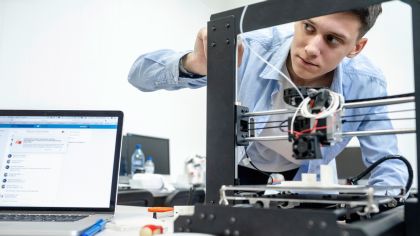- 7 courses covering a range of essential RF and microwave topics
- Unlimited individual access to all course content on-demand 24/7 for 365 days
- IEEE Certificate of Completion
- 1 Continuing Education Unit (CEU)
- 10 Professional Development Hours (PDHs)


Location: Online (on-demand)
Availability: Full-time students only
Target group: 3rd-4th year undergraduates

Language: EN
Time to Complete
Approximately 10 hrs 30 mins
Cost
150 EUR
Course overview
This online RF and Microwave Engineering program, available exclusively to full-time students only, comprises seven individual courses. It provides a thorough foundation in radio frequency and microwave technology, from basic principles through to measurements and modulation. The curriculum begins with fundamental concepts of electromagnetic waves and propagation, establishing core knowledge about the RF spectrum, Maxwell's equations, and essential wave characteristics. Students then explore transmission lines and the Smith Chart, crucial for understanding impedance matching and power transfer in RF systems. The program progresses through connector types and proper handling techniques - practical skills essential for reliable RF measurements and system integrity. Building upon these foundations, students learn about discrete RF components that form the building blocks of modern wireless systems, followed by an exploration of various transceiver architectures, including superheterodyne and direct conversion designs. The latter portion of the program focuses on essential measurement techniques using specialized RF test equipment, culminating with modern digital modulation measurements, critical for today's wireless communications systems.
Topics
- Historical perspective on RF communications development
- RF and microwave fundamentals including wave propagation and the electromagnetic spectrum
- Transmission line theory, characteristic impedance, and impedance matching
- RF connector types, mechanical compatibility, and proper connector care
- Essential RF components: mixers, oscillators, amplifiers, couplers, filters, and modulators
- Transceiver architectures: superheterodyne and direct conversion systems
- Modern RF transceiver chipsets and their applications
- RF power measurement techniques and power units (dB, dBm, dBW)
- Network analyzer principles and applications
- Spectrum and vector signal analyzer measurements
- Digital modulation measurement techniques (EVM, BER, ACP)
- RF nonlinear measurements and characterization
- Receiver sensitivity and spurious response testing
- RF safety considerations and regulatory compliance
Target audience
Please note that this program is available only to full-time students studying at a recognized university or college. The program is designed for individuals entering the field of RF and microwave engineering who wish to build a solid foundation of knowledge across the entire RF ecosystem. The curriculum balances theoretical concepts with practical applications, making it accessible to those with a basic technical background.
- Students and engineering interns
Technical level
While no formal prerequisites are required, students will benefit from a basic technical background. The course presents complex RF concepts without heavy mathematical treatment, making it accessible to those with fundamental technical knowledge and a willingness to learn specialized RF terminology and principles.
What you receive
- Available on-demand 24/7
- 1 year unlimited access
- IEEE Certificate of Completion
- 1 Continuing Education Unit (CEU)
- 10 Professional Development Hours (PDHs)



